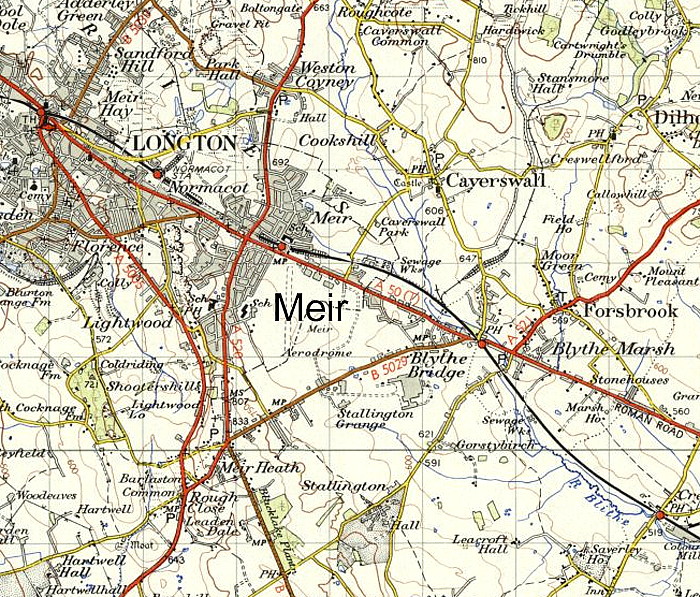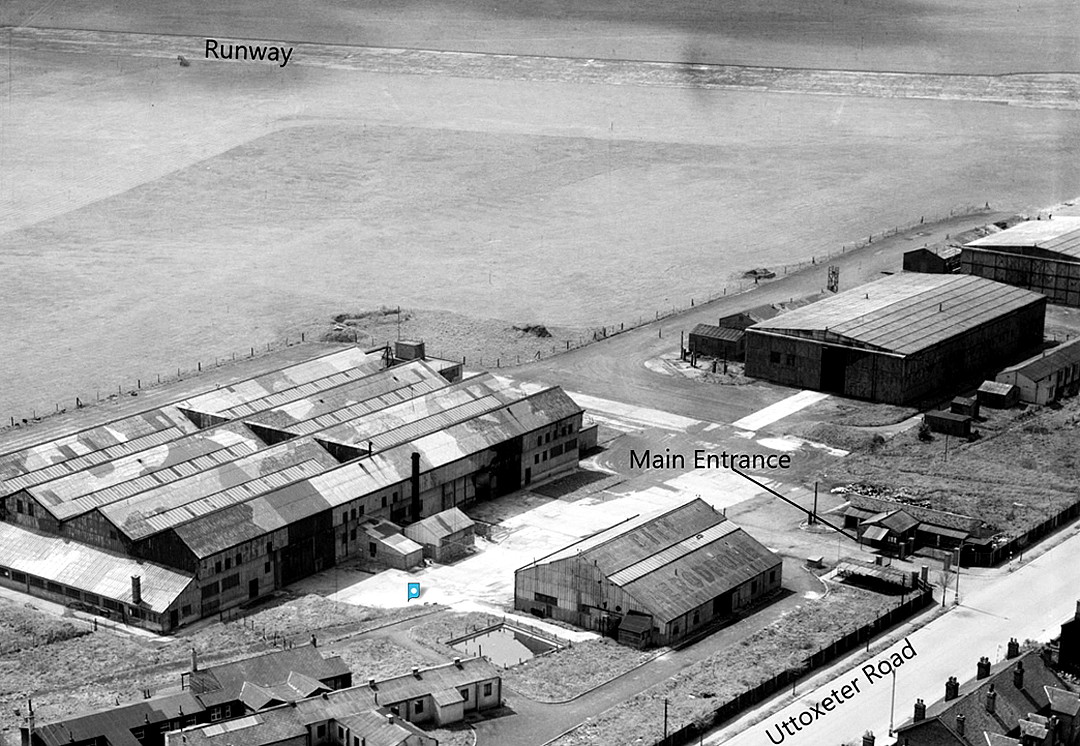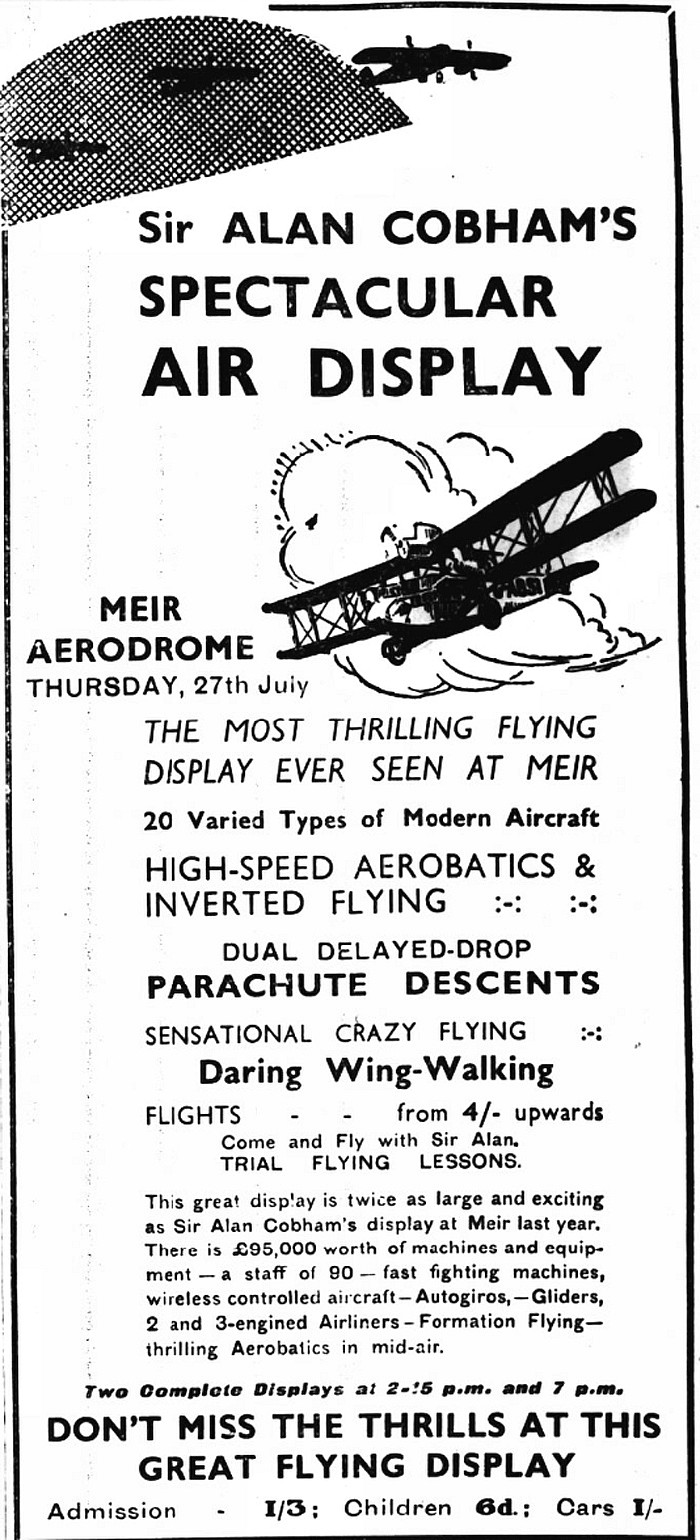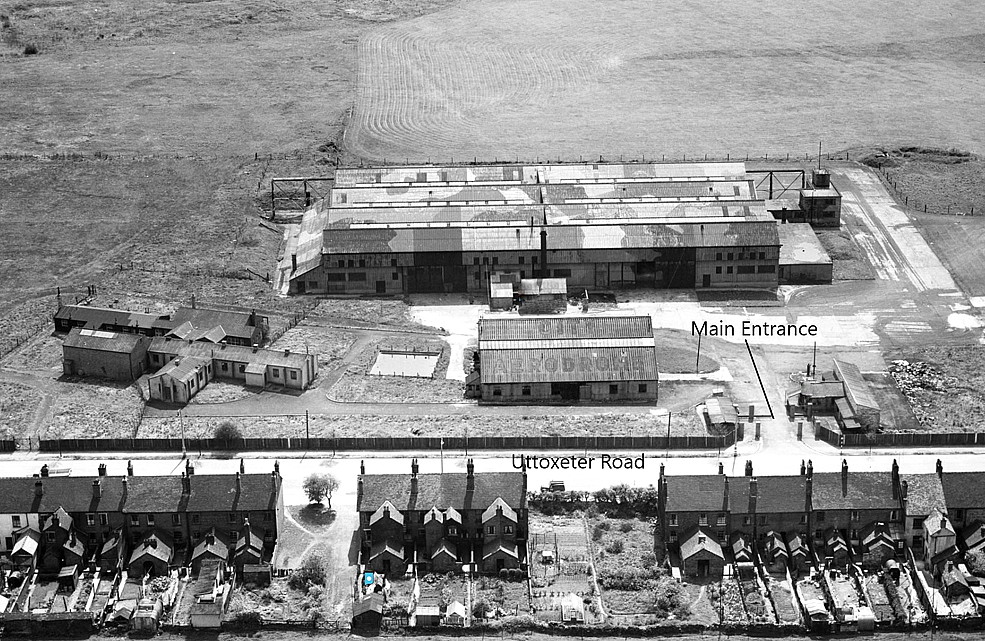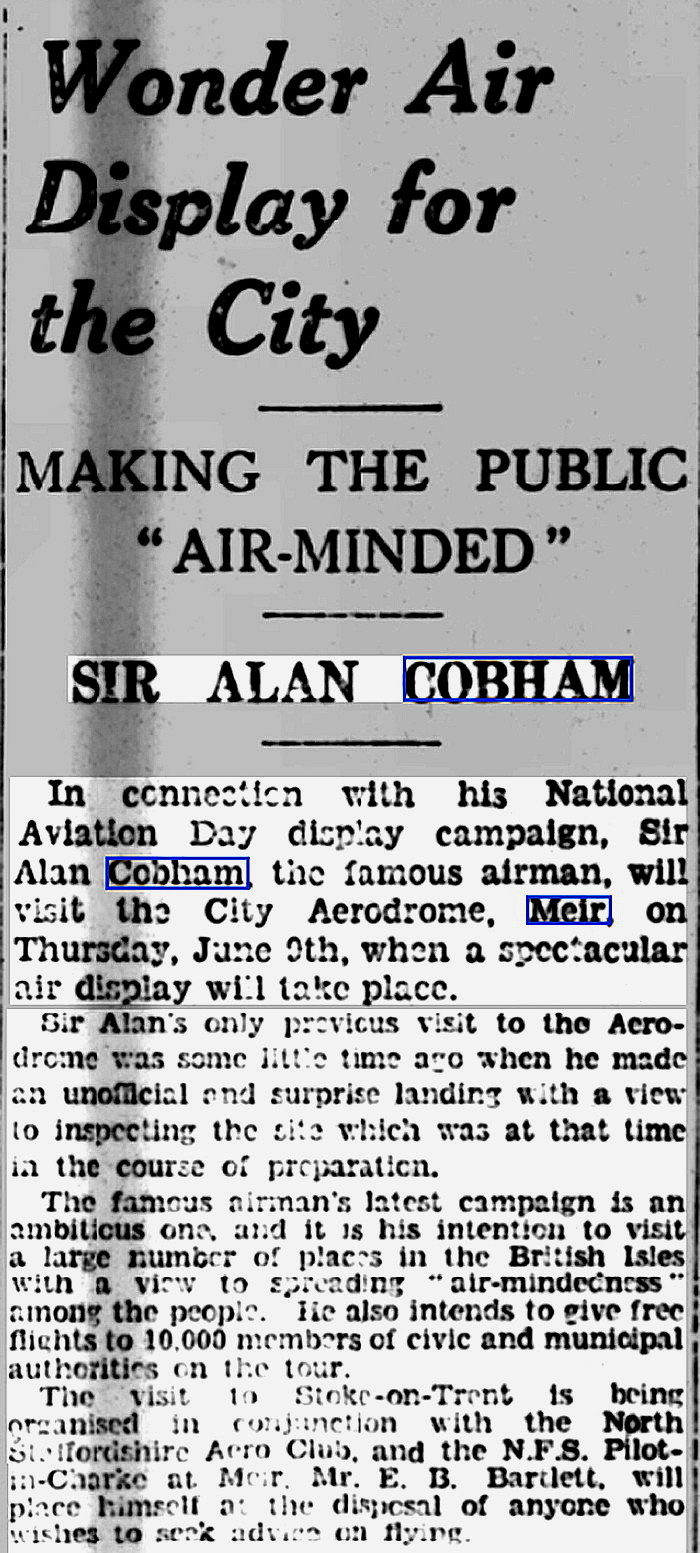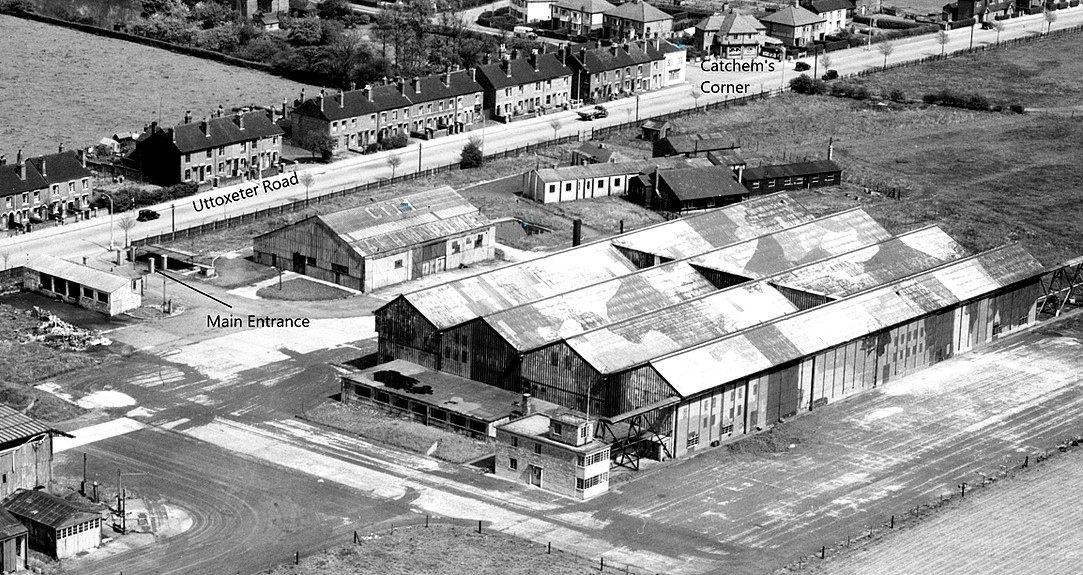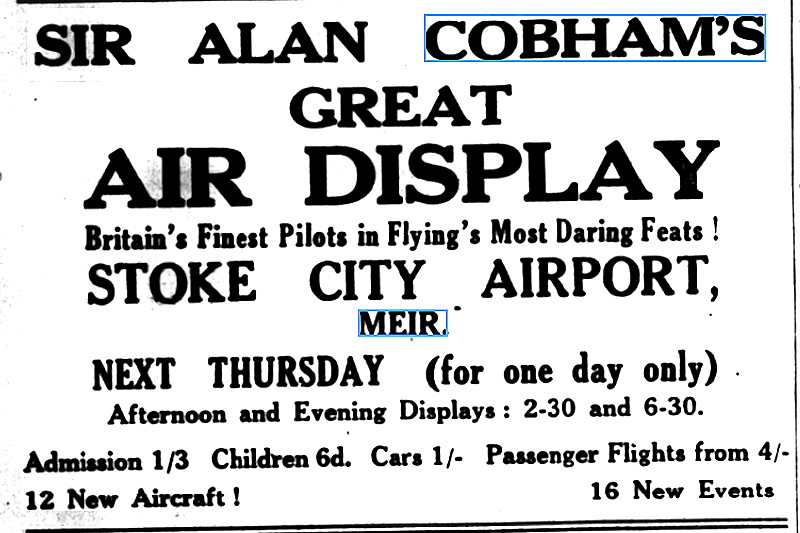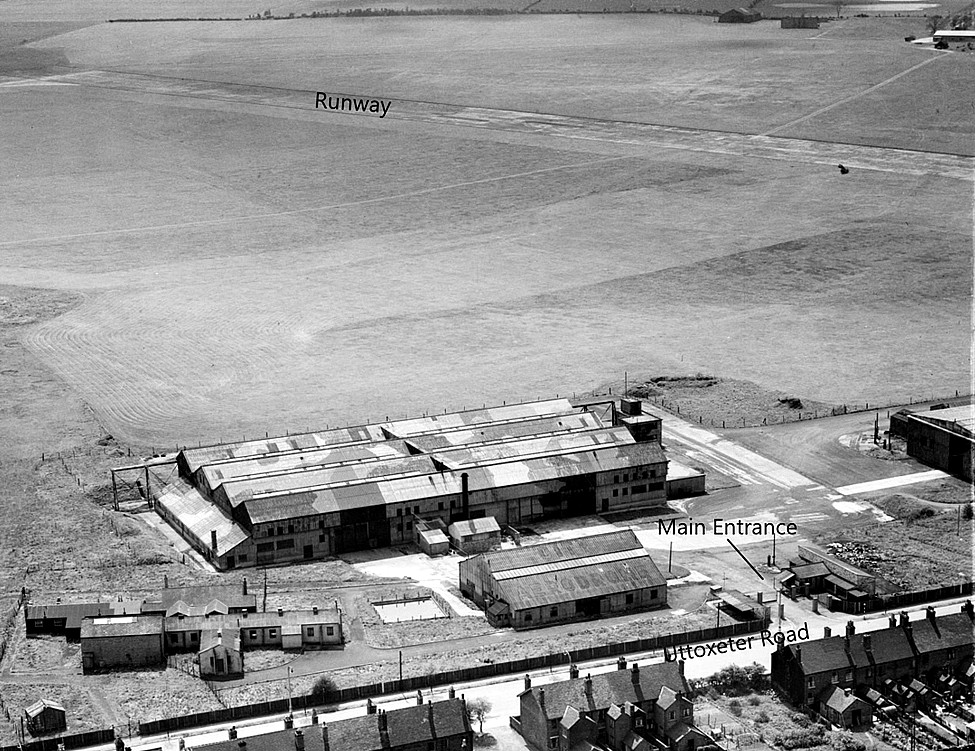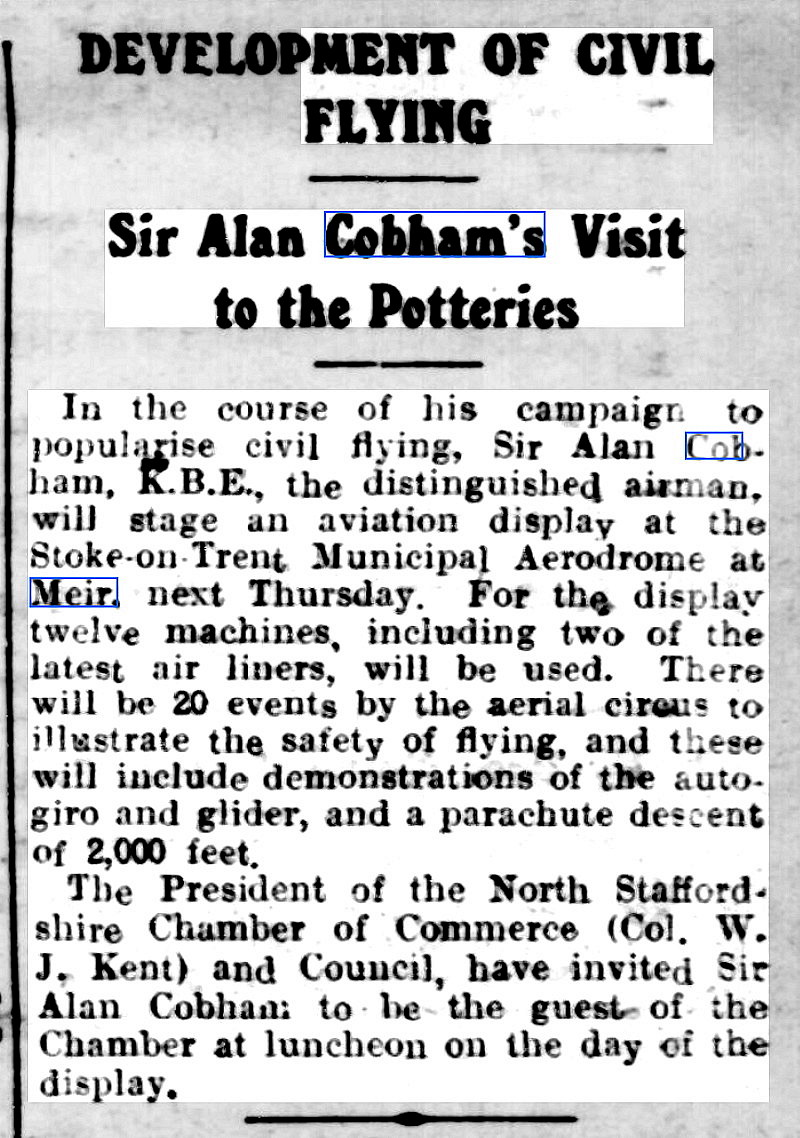Meir
MEIR: Civil regional airport later civil aerodrome
(Also known as MEIR AERODROME / AIRPORT and STOKE-on-TRENT - originally known as CITY AERODROME)
Operated by: 1930s: National Flying Services and The North Staffordshire Aero-Club on behalf of Stoke-on-Trent Corporation
Military users: Pre 1940 and WW2: Royal Air Force
Volunteer Reserve
28 E&RFTS
No.1 FPU (Flying Practise Unit)
5 EFTS
Airline users: Pre 1940: Railway Air Services
Post 1945: Dragon Airways
Flying club/school: Pre 1940: North Staffs Aero Club
1959 ‘snapshot’. Stoke-on-Trent Flying Club
Gliding: Listed as operating in 1975
Manufacturing: WW2: Rootes factory at Blyth Bridge, connected to MEIR by a long taxiway
Location: Just S of the A50, about 3.5nm SSE to SE of Stoke-on-Trent town centre, 2nm from Longton station
Period of operation: 1932 to 1975? (Officially opened it seems on 18th May 1934)
Note: It appears the RAF mainly closed their involvement soon after WW2 ended.
Runway(s): Originally ‘all-over’ grass (?) Maximum landing run in the 1930s, 914 grass
Note: As the photos below show, a hard runway was laid out, presumably in WW2?
A MICHAEL T HOLDER GALLERY
Note: The advert was published in the Staffordshire Sentinel on the 25th July 1933.
Note: The article was published in the Staffordshire Sentinel on the 13th April 1934. The name 'City Aerodrome' can be made out on the roof of the original hangar.
Note: The advert was published in the Staffordshire Sentinel on the 5th June 1934, and the article in the same newspaper on the 4th June 1934.
NOTES: Without too much doubt, the creation of the aerodrome at MEIR, was a result of Sir Alan Cobham's tour in 1929, intended to exhort local authorities to construct a national network of aerodromes, not least to encourage the development of regional airlines.
His National Aviation Day display tours visited this location three times, in 1932, 1933 and 1934.
52nd venue, (9th June 1932), for Sir Alan Cobham’s National Aviation Day UK Display Tour. This tour started at HANWORTH on the 12th April and ended at CHINGFORD on the 16th October. In all, 174 venues were planned for displays.
59th venue for the No.1 tour, (27th July 1933). This year the tour was divided into two tours, the No.1 tour started at CENTRAL PARK Dagenham on the 14th April and ended CHERTSEY LANE, Staines on the 8th October. 116 venues were planned to be visited by the No.1 Tour.
51th venue, (7th June 1934). This tour also started at CENTRAL PARK Dagenham on the 14th April but ended at MAYLANDS aerodrome, Romford on the 30th September. For this tour 159 venues were in the schedule.
OTHER VISITS
It appears that in 1933 the British Hospitals Air Pageant tour, organised by Barker & McEwen King, displayed here on the 3rd and 4th June. That tour started at LUTON on the 1st April and ended at WOOLWICH on the 8th October. 150 venues were planned to be visited and this was the 48th venue.
It also appears that MEIR was the 94th venue on the 15th August 1936 for the British Empire Air Display tour, also organised by Barker & McEwen King. That tour started at LUTON on the 8th April and ended at Birmingham, (presumably CASTLE BROMWICH?) on the 6th September. The schedule for that tour was 111 venues.
In 1935 Staffordshire Airplanes operated here, but what did they do?
It is probably hard to envisage today, but in the early pioneering days of commercial aviation in England especially, the pilots often had a devil of a job navigating when approaching major cities or industrial conurbations like this. The haze from factories and coal fired homes was a distinct hazard and after heavy rainfall these grass aerodromes were often very tricky to operate from especially when trying to calculate the take-off run required, if they much bothered?
It also has to be pointed out that although listed here and elsewhere as being ‘military users’ the EFTS (Elementary Flying Training School) type of operation found here was initially at least, (and as often as not and perhaps invariably?), fundamentally a civilian affair administered by a quasi-military authority. It’s a hugely complicated subject and not really part of what this Guide attempts to either explain or describe. But fascinating nevertheless.
In effect some very forsighted people, realising what was going on in Germany, saw that the RAF needed to be hugely strengthened with both suitable aircraft and aircrews. The formation of EFTS (Elementary Flying Training Schools) also recognised that people of ability had to be sourced, and not just those affluent enough to comfortably afford to fly.
THE ROOTES FACTORY
During WW2 the Rootes factory in Blyth Bridge roughly E of the airfield had a long taxiway which connected it to MEIR and many Bristol Blenhiems, later Beaufighters too, were built here.
AIRLINE SERVICES
During the summer of 1955, commencing in early June, Dragon Airways based at SPEKE (LANCASHIRE) operated scheduled services to JERSEY in the Channel Islands using their two de Havilland DH114 Herons.
A BIT MORE INFO
In a listing of “UK Operational Aerodromes” published in about 1975 it was said, “At time of writing, building is in progress, and closure of the airfield expected soon”. It would be nice to know more about MEIR as it seems to have become one of the ‘forgotten’ regional airports.
In 1977, although listed as closed, the Luton L.A.4a Minor G-AYSK was still recorded as being based here! One poor soul holding out?
Mark Hesselgreaves
This comment was written on: 2018-11-16 13:44:43As a small boy i used to walk up to the airfield on nice days from my Great Grand-,as who lived on Gravely Bank. Near the corner of the field was an old pillbox, i seem to remember. I can remember seeing gliders being launched using a car, as i was only a boy i was always out of the way from danger but i do remember. It was only recently i saw it was now a housing estate.
roy allen
This comment was written on: 2019-05-31 15:42:51I lived on adamthwaite drive from 1935 to 1956 on the edge of Meir aerodrome and remember the Miles magister trainers skimming our rooftops also on the edge of the airfield their was remains of a quarry where we used to play as lads and buried there later on there were many aircraft parts i used to get pieces and take them home as something to play with. What a difference now when I visited recently to see houses and shops I remember looking across the airfield all the way to Sandon Road Meir I left in 19956 to live in North Wales ,
Timothy Foster
This comment was written on: 2019-12-27 22:20:46I learned to fly at Meir airfield in 1957 when I was 16 in Slingsby Cadet gliders. I went solo after 41 launches and about 3 hours flying spread over 7 seven consecutive Sundays in August and September. I used to pedal cycle 25 miles each way.
Michael T Holder
This comment was written on: 2020-05-27 16:37:48From the Staffordshire Sentinel – Monday 06 June 1932 Sir Alan Cobham’s Great Air Display Thursday 09 June 1932 at the Aerodrome Meir. He also visited on 27 July 1933 for a third time on Thursday 07 June 1934. He visited on his own 07 May 1931 for an on-site review to check the suitability of the airfield for flying displays having had his representatives survey it back in June 1929.
We'd love to hear from you, so please scroll down to leave a comment!
Leave a comment ...
Copyright (c) UK Airfield Guide














